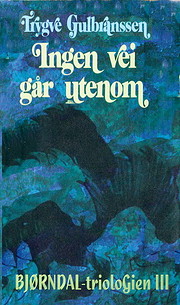

Click on a thumbnail to go to Google Books.
|
Loading... Ingen vei går utenom (1935)by Trygve Gulbranssen
 None No current Talk conversations about this book. no reviews | add a review
Is contained in
Om tre generationer på storgården Bjørndal i Norge i tiden 1760 til 1810. No library descriptions found. |
Current DiscussionsNonePopular covers
 Google Books — Loading... Google Books — Loading...GenresMelvil Decimal System (DDC)839.82Literature German & related literatures Other Germanic literatures Danish and Norwegian literatures Norwegian literatureLC ClassificationRatingAverage: (4.28) (4.28)
Is this you?Become a LibraryThing Author. |
||||||||||||||||||||||||||||||||||||||||||||||||||||||||||||||||||||||||||||||||||||||||||||||||||||||||||||||||||||||||
Once read, you never be in doubt of which of the three books in the trilogy comes first and last: The story is told by the three titles alone, to anyone having knowledge of the Bible.
In "Beyond sings the Woods" the wood that is singing in the people from the Bear valley, has sung in Man since Adam was chased into the wilderness. Old Dag is fighting the bear in himself most of his life.
In the second book, "The wind from the Mountain" his son, young Dag is exposed to death, both by loosing loved ones and by just surviving death himself.
The third book in the trilogy is worked into the second book in the English translation. If translated from Norwegian it would be something like "What you cannot Escape". The book is what becomes the law of young Dag´s life after coming down from the mountain, how his way of thinking is affected by his experiences, and how it translates into practical life, and even more what reactions his actions gets from the surroundings.
As an allegory of the Christian creed, Gulbranssen´s Bjørndal Trilogy matches Dostoyevsky novel "the Idiot". Only the inner and outer fight is not taking place at the Russian court, and young Dag is not prince Myshkin. The story is set in Norway; the tone is more subdued, young Dag is not hysterical, he is as down to earth as the landscape he lives in. The choices that has to be made is not theoretical, not about something far off, but practical choices about daily life, being done on daily basis. (